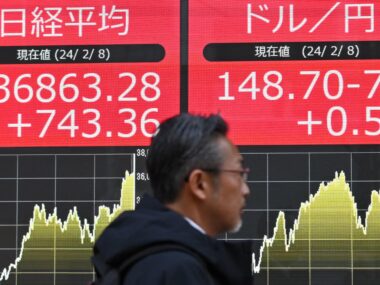China is no longer anticipated to overtake the US as the largest economy anytime soon, and it may never overtake the US to grab the top rank, according to a study by Bloomberg. This is because the nation’s trust is declining.
According to the analysis, China won’t overtake the US in terms of gross domestic product until the middle of the 2040s, and even then, it won’t be by much before it starts “falling behind” at that time. They anticipated that China will take over and hold the top rank at the start of the following decade before the epidemic.
Bloomberg Economists stated in a research report released on Tuesday that “China is down-shifting onto a slower economic path sooner than we predicted. The post-COVID recovery has stalled in light of the worsening real estate downturn and waning confidence in Beijing’s handling of the economy. Weak confidence runs the risk of being entrenched, which would permanently reduce economic potential.
According to experts, the second-largest economy in the world, China, is now anticipated to grow more slowly, to 3.5% in 2030 and 1% or less by 2050. This is less when compared to earlier projections of 4.3% and 1.6%, respectively.
Due to financial constraints and a housing crisis, China’s economy expanded by just 3% last year, one of the weakest rates of development in recent memory. Its successful reopening encouraged hope that the economy will strengthen this year. The recovery has lost steam, though, as exports plunge and the real estate depression deepens. Additionally, Bloomberg questioned economists who revised their 2024 growth predictions downward to below 5%.
The revised assessment comes at a time when the international community is rethinking how to handle a China that might be approaching its power peak.
In addition to considering the broader implications of the slowdown, the US and the Group of Seven nations are increasingly looking for indications of deep-seated structural problems in China. They are looking for opportunities that could ultimately strengthen the West’s position against a falling geopolitical foe. Due to this year’s failures, commodities and stocks are already in a state of chaos.
China is also dealing with more serious, long-term problems. In 2017, the nation experienced its first population fall since the 1960s, fueling worries about declining productivity. Regulation-related crackdowns and geopolitical tensions with the US and other Western governments have also had an influence on confidence.
However, it appears that the US is doing better than many economists had predicted a few months ago. A healthy labor market, solid consumer spending, and low inflation have helped the economy temporarily avoid going into a recession.
In 2022–2023, the US is expected to increase by 1.7%, according to Bloomberg Economics, with a gradual fall to 1.5% by 2050, according to long-term predictions.











